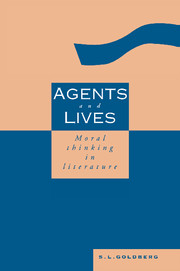Book contents
- Frontmatter
- Contents
- Acknowledgments
- Preface
- 1 ‘Perpetually moralists’ … ‘in a large sense’
- 2 ‘How to live’ and ‘how to live’
- 3 Agents and lives: making moral sense of people
- 4 ‘Doing good to others’: some reflections on Daniel Deronda
- 5 Moral thinking in The Mill on the Floss
- 6 Finding congenial matter: Pope and the art of life
- 7 Literary judgment: making moral sense of poems
- 8 Afterword: some limits of philosophy?
- Notes
- Index
2 - ‘How to live’ and ‘how to live’
Published online by Cambridge University Press: 19 January 2010
- Frontmatter
- Contents
- Acknowledgments
- Preface
- 1 ‘Perpetually moralists’ … ‘in a large sense’
- 2 ‘How to live’ and ‘how to live’
- 3 Agents and lives: making moral sense of people
- 4 ‘Doing good to others’: some reflections on Daniel Deronda
- 5 Moral thinking in The Mill on the Floss
- 6 Finding congenial matter: Pope and the art of life
- 7 Literary judgment: making moral sense of poems
- 8 Afterword: some limits of philosophy?
- Notes
- Index
Summary
‘How to live’: that is, how should we live, how is it best for us to live. In discussing Plato's phrase, Arnold left aside the particular nature of the claim that morality makes on us (as distinct from manners, say, or laws), but he did put succinctly the substantive question at the centre of moral thinking. On the other hand, he also managed to overlook a crucial ambiguity in the question. For it makes an important difference whether we emphasize the word ‘how’ or the word ‘live’: how to live, or how to live. Being perpetually moralists we ask both questions, of course; but to ask the former is to have in mind the moral-in-a-narrow-sense, whereas with the latter it is the moral-in-a-large-sense. With the former, we are asking about the difference between right and wrong (or good and bad) in human actions: that is, in what we call moral conduct; or between dispositions to, or habits of, right and wrong (good and bad) conduct: that is, in what we call moral virtues and vices; or between the sum total of a person's virtues and vices: that is, in what we call moral character. When we ask ‘how to live’ however, we are asking about the inner coherence of various modes of human life, and how to evaluate them as modes of life, individual or social; about the value of the manifold capacities, potentialities, wants and needs of human beings; about what is ‘truly’ human, or what the ‘perfection’ or ‘well-being’ of a life consists in, or what the finest and fullest modes of human vitality.
- Type
- Chapter
- Information
- Agents and Lives , pp. 36 - 62Publisher: Cambridge University PressPrint publication year: 1993
- 1
- Cited by



